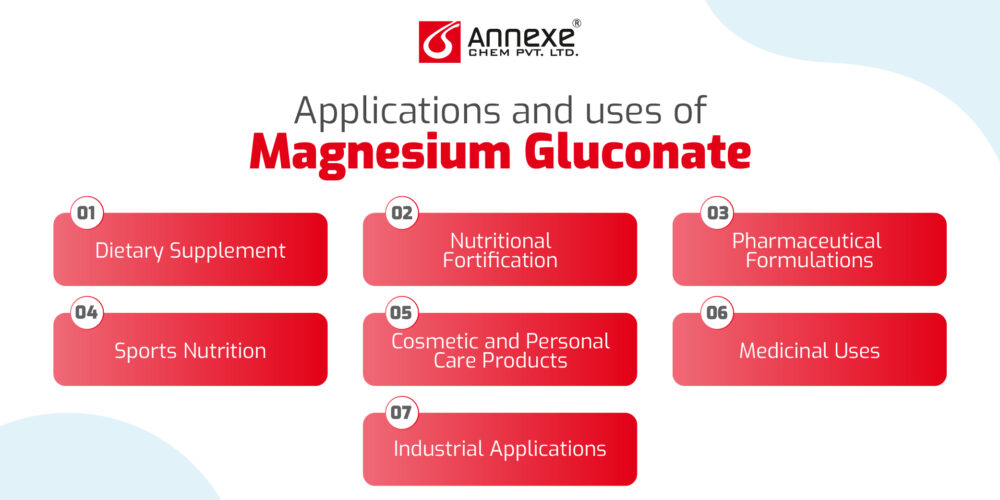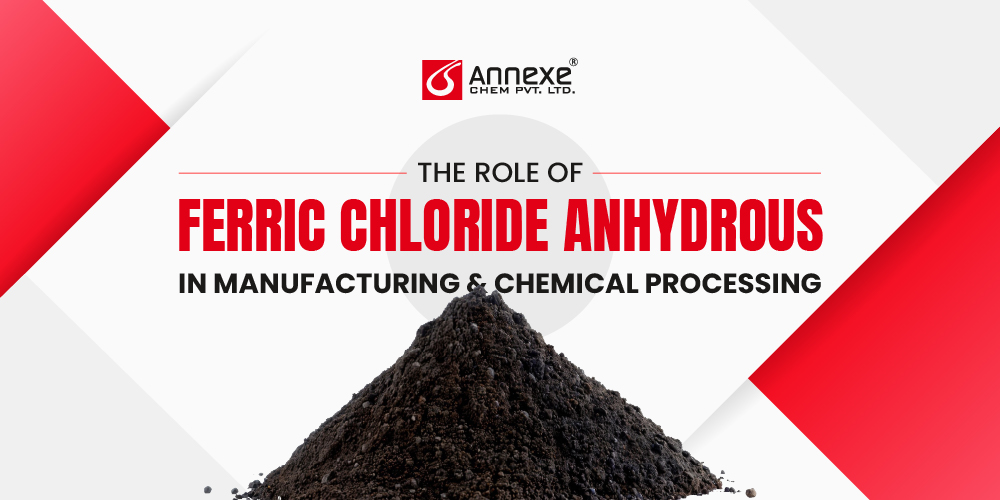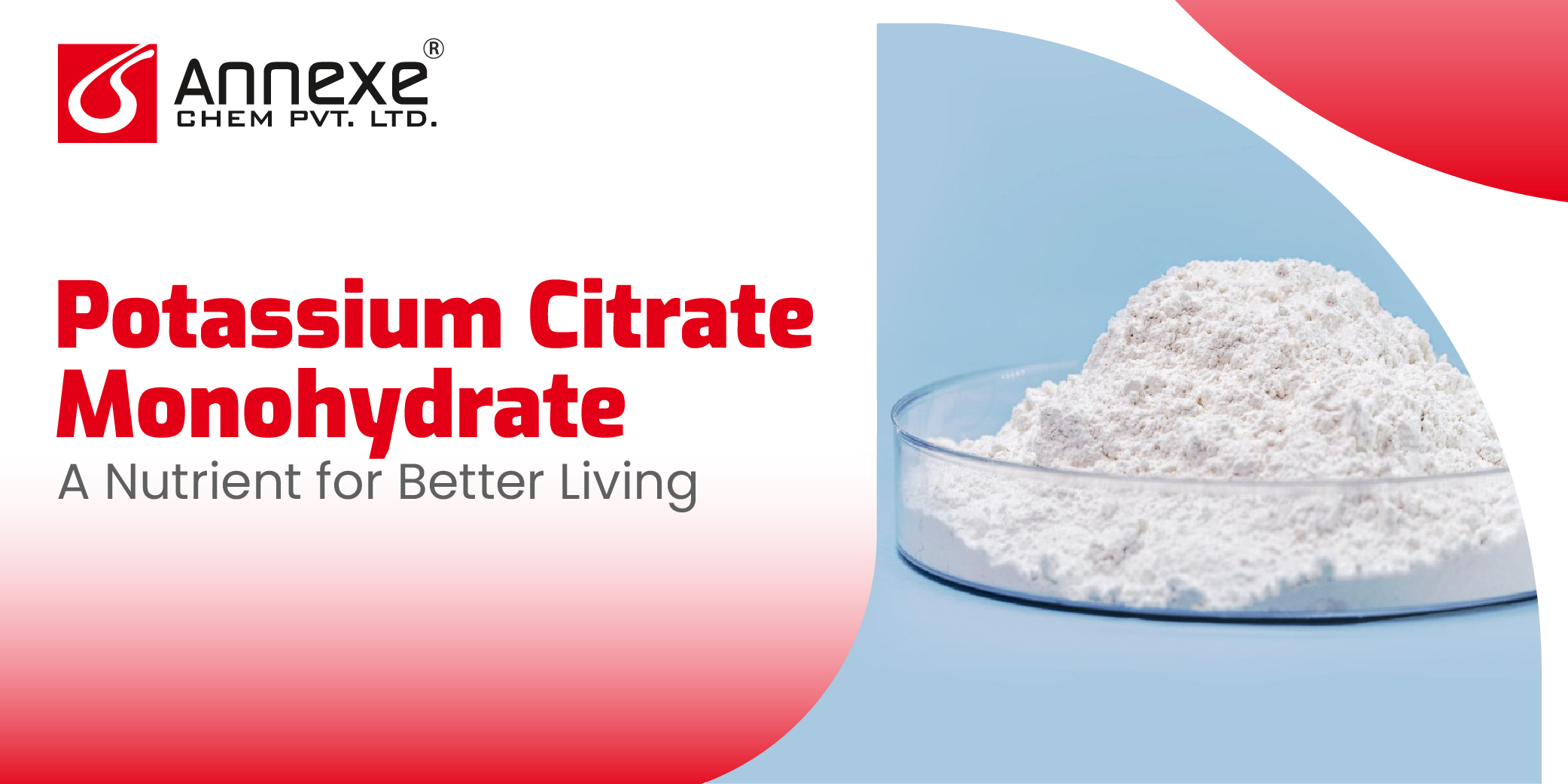Magnesium Gluconate: Boost Health with Daily Supplementation
Magnesium Gluconate: Your Daily Source Of Overall Health

- February 7, 2024
- By Akshita Patel
The chemical structure of magnesium gluconate is C12H22MgO14. Magnesium gluconate is a form of magnesium supplement known for its high bioavailability. Magnesium is an essential mineral involved in over 300 biochemical reactions in the body. It plays a vital role in muscle and nerve function, energy production, blood pressure regulation, and bone health maintenance. Despite magnesium’s importance, many people consume too little magnesium in their diets. Supplementing with magnesium gluconate can help bridge this gap and support overall health and well-being by ensuring adequate magnesium levels.
Sources Of Magnesium Gluconate
Magnesium gluconate is commonly found in supplement form and available over the counter at pharmacies, health food stores, and online retailers. These supplements typically come in tablets or capsules, with varying dosages.
Some multivitamins and mineral supplements may contain magnesium gluconate as part of their ingredient list. It’s essential to read labels carefully and choose reputable brands to ensure product quality and purity. Despite not being found in significant quantities in food sources, magnesium gluconate is typical as a supplement. Therefore, supplementation is often necessary to meet daily magnesium requirements.
Physical Properties of Magnesium Gluconate
The physical properties of magnesium gluconate contribute to its characteristics and behaviour in different environments. Here are some notable physical properties:
- Appearance: Magnesium gluconate typically appears as a white to off-white powder or granules. In its solid form, it may have a crystalline structure.
- Texture: The texture of magnesium gluconate powder is generally fine and granular, with particles that can vary in size depending on the manufacturing process.
- Odor and Taste: Magnesium gluconate is generally odourless and has a slightly acidic or sour taste due to the presence of gluconic acid.
- Solubility: Magnesium gluconate is soluble in water, and can dissolve in aqueous solutions. This solubility contributes to its bioavailability when taken orally as a dietary supplement.
- Hygroscopicity: Magnesium gluconate may exhibit hygroscopic properties and can attract and absorb moisture from the surrounding environment. Proper storage in a dry environment is essential to prevent clumping and maintain product quality.
- Melting Point: The melting point of magnesium gluconate can vary depending on factors such as purity and crystalline form. Generally, it decomposes before reaching a distinct melting point when subjected to high temperatures.
- Density: The density of magnesium gluconate may vary depending on its physical form (e.g., powder, granules) and packing density. It is typically less dense than water.
- Stability: Magnesium gluconate is relatively stable under normal storage conditions, when protected from moisture, light, and heat. However, it may degrade when exposed to unfavourable conditions, leading to potency.
Understanding these physical properties is essential for handling, processing, and formulating products containing magnesium gluconate, whether in pharmaceutical, food, cosmetic, or other industries. Proper storage and handling can help maintain the integrity and effectiveness of magnesium gluconate-containing products.
Chemical Composition And Properties Of Magnesium Gluconate
Magnesium gluconate is a compound composed of magnesium and gluconic acid. Here’s a breakdown of its chemical composition and properties:
- Chemical Formula: The chemical formula of magnesium gluconate is Mg(C6H11O7)2. A magnesium gluconate molecule contains two molecules of gluconic acid coordinated with a magnesium ion.
- Molecular Weight: The molecular weight of magnesium gluconate is approximately 414.60 g/mol.
- Appearance: Magnesium gluconate typically appears as a white to off-white powder or granules. It is also available in tablets or capsules for oral supplementation.
- Solubility: Soluble in water in magnesium gluconate contributes to its bioavailability when consumed orally. The solubility in water allows for efficient absorption in the gastrointestinal tract.
- Stability: In normal storage conditions, magnesium gluconate is relatively stable when protected from moisture and excessive heat. However, it may undergo decomposition if exposed to high temperatures or acidic environments.
- Bioavailability: Magnesium gluconate is known for its high bioavailability, meaning that a significant portion of the magnesium content is absorbed and utilised by the body after ingestion. It makes it an effective form of magnesium supplementation for addressing magnesium deficiency.
- Magnesium Content: The magnesium content in magnesium gluconate supplements typically varies, with each dose providing a specific amount of elemental magnesium. It’s essential to check the product label for the exact magnesium content per serving.
- Usages: In individuals with magnesium deficiencies or at risk of magnesium deficiencies, magnesium gluconate serves as a dietary supplement. It employs pharmaceutical formulations for the treatment of magnesium deficiency-related conditions.
Understanding the chemical composition and magnesium gluconate properties is crucial for proper use as a dietary supplement or pharmaceutical ingredient. Follow recommended dosages and consult healthcare professionals when considering magnesium supplementation.
How Does Magnesium Gluconate Differ From Other Forms of Magnesium Supplements?
Magnesium gluconate stands out among other magnesium supplements due to its high bioavailability and gentle effect on the digestive system. Compared to magnesium oxide, gluconate is less likely to cause gastrointestinal discomfort, making it a preferred choice for those with sensitive stomachs.
- High Bioavailability: Magnesium gluconate is known for its relatively high bioavailability, meaning it is readily absorbed and utilised by the body compared to other magnesium supplements.
- Gastrointestinal Tolerance: Magnesium gluconate is generally well-tolerated and less likely to cause gastrointestinal discomfort, such as diarrhoea by magnesium oxide.
- Magnesium Content: Magnesium gluconate usually provides a moderate elemental magnesium per dose, though it may vary among supplements.
- Formulation: Magnesium gluconate is commonly available in tablet or capsule form, allowing for convenient and precise dosing.
- Suitability for Specific Needs: Some individuals may prefer magnesium gluconate due to its gentle nature on the stomach or its bioavailability, especially if they have gastrointestinal sensitivities or difficulty absorbing other forms of magnesium.

Applications and Uses of Magnesium Gluconate
Magnesium gluconate are applicable in various applications due to its role as a source of magnesium, an essential mineral involved in numerous physiological processes. Some typical applications and uses of magnesium gluconate include:
- Dietary Supplement: It enhances magnesium levels or addresses magnesium deficiency. It is available in tablets, capsules, powders, and liquid formulations for oral consumption.
- Nutritional Fortification: Magnesium gluconate is added to fortified foods and beverages to enhance their magnesium content. This fortification can help individuals meet their daily magnesium requirements, especially in populations with inadequate dietary magnesium intake.
- Pharmaceutical Formulations: Magnesium gluconate is incorporated into pharmaceutical formulations for magnesium deficiency-related treatment or prevention. It may be used in intravenous (IV) solutions for severe magnesium deficiency cases or oral medications for milder deficiencies.
- Sports Nutrition: Magnesium gluconate is sometimes included in sports nutrition products, such as energy bars, drinks, and supplements, to support muscle function, energy metabolism, and electrolyte balance. Athletes and physically active individuals may benefit from magnesium supplementation to optimise performance and recovery.
- Cosmetic and Personal Care Products: Magnesium gluconate may be added to cosmetic and personal care products, including skincare and hair care products, for its potential skin-conditioning properties. It may help improve skin hydration and contribute to overall skin health.
- Medicinal Uses: Magnesium gluconate is utilised in traditional and alternative medicine practices for various medicinal purposes. It may be recommended for managing conditions such as muscle cramps, migraines, hypertension, and premenstrual syndrome (PMS), although scientific evidence supporting these uses varies.
- Industrial Applications: In industrial settings, magnesium gluconate may find applications in processes requiring magnesium compounds, such as specific chemical reactions, manufacturing processes, and research applications.
It is a versatile compound with widespread applications across dietary supplementation, pharmaceuticals, sports nutrition, cosmetics, and other industries. Its importance in maintaining optimal health and well-being underscores its relevance in various fields and consumer products.
Safety guidelines for Magnesium Gluconate
Dietary supplements containing magnesium gluconate are commonly used to address magnesium deficiency. It is generally safe when taken in appropriate doses, and following safety guidelines to prevent adverse effects is essential. Here are some general safety guidelines for magnesium gluconate:
- Follow Recommended Dosage: Stick to the recommended dosage provided by healthcare professionals or as indicated on the product label. Excessive intake of magnesium can lead to toxicity symptoms such as diarrhoea, nausea, and abdominal cramping.
- Consult with a Healthcare Provider: Before starting magnesium gluconate supplementation, especially if you have any underlying health conditions or are taking medications, consult a healthcare provider to ensure it is safe.
- Avoid Certain Conditions: Individuals with kidney problems or severe kidney disease should avoid magnesium supplementation without healthcare professional advice.
- Monitor Magnesium Levels: On a long-term basis, it may be prudent to periodically monitor your magnesium levels through blood tests to prevent excessive accumulation.
- Watch for Interactions: Magnesium supplements can interact with certain medications, including antibiotics, diuretics, and medications for heart conditions. Be sure to discuss potential interactions with your healthcare provider.
- Stay Hydrated: Ensure adequate hydration when taking magnesium supplements, as dehydration can exacerbate the risk of magnesium toxicity.
- Take with Food: Taking magnesium gluconate with food can help reduce the risk of gastrointestinal upset.
- Store Properly: Store magnesium gluconate supplements according to the manufacturer’s instructions, typically in a cool, dry place away from direct sunlight.
- Keep Out of Reach of Children: Like all supplements and medications, keep magnesium gluconate out of the reach of children to prevent accidental ingestion.
- Discontinue if Adverse Effects Occur: If you experience any adverse effects while taking magnesium gluconates, such as severe diarrhoea, vomiting, or allergic reactions, discontinue use and seek medical attention.
Remember that while magnesium gluconate can be beneficial for addressing magnesium deficiency when used appropriately, it’s essential to prioritise safety and consult with healthcare professionals when in doubt.
Conclusion
Magnesium gluconate offers a convenient and effective way to supplement magnesium intake, supporting various aspects of health, from muscle function to heart health and beyond. However, it’s crucial to be aware of potential risks and side effects and to follow recommended dosage guidelines. Consulting with a healthcare professional can help ensure safe and beneficial supplementation tailored to individual needs.
Experience the excellence of Annexe Chem’s wide range of fine chemicals, including high-quality magnesium gluconate supplements. As a leading manufacturer, supplier, and exporter of magnesium gluconate, we uphold stringent quality standards to ensure reliable products. Visit our website to learn more about our offerings and place your order today, benefiting from our commitment to quality and customer satisfaction.

Akshita Patel
As an advocate for sustainability, Akshita is committed to driving positive change within the chemical industry. She actively seeks out environmentally friendly solutions and promotes the adoption of sustainable practices. Akshita believes that a balance between economic growth and ecological responsibility is crucial for the industry's long-term success. She is dedicated to finding innovative ways to minimize environmental impact while maximizing efficiency and profitability.
Related Blogs

- February 22, 2025
- By Akshita Patel
The Role of Ferric Chloride Anhydrous.
Imagine a world without clean drinking water, advanced electronics, or high-quality metal refining. Sounds impossible, right?.

- February 26, 2024
- By Akshita Patel
Potassium Citrate Monohydrate: A Nutrient for.
Potassium citrate monohydrate is a compound commonly used in supplements and medications due to its diverse.



